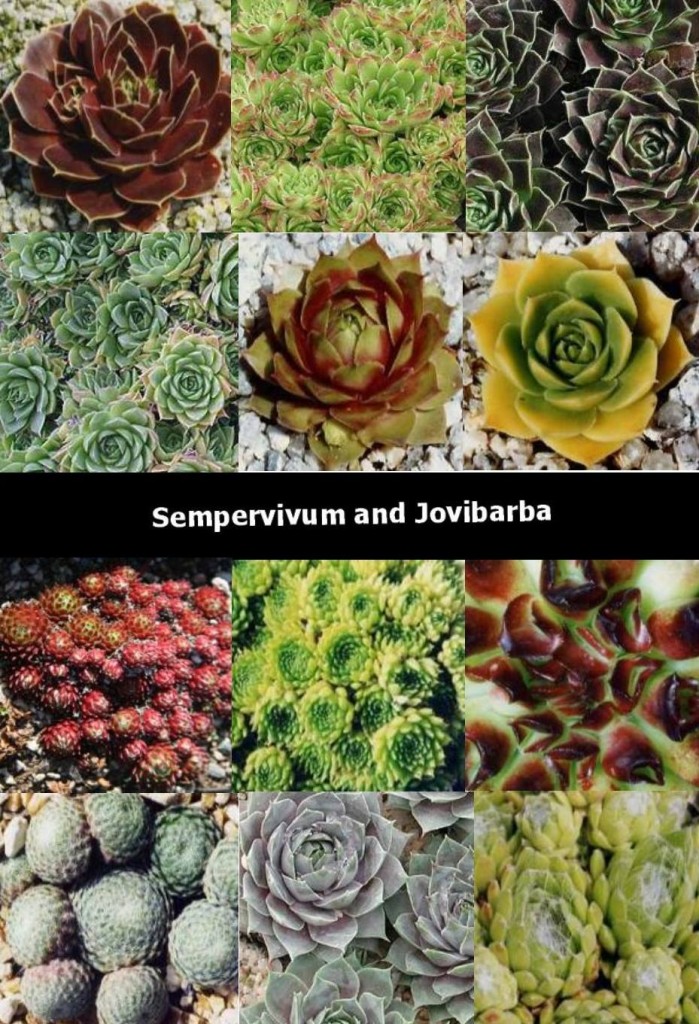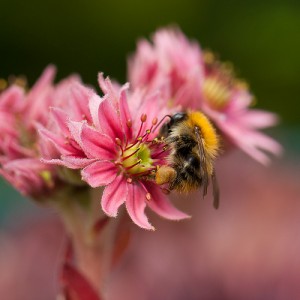Sempervivum and Jovibarba heuffelii are closely related. Both grow naturally in the mountains of Europe and Eurasia. Jovibarba is a genetic newcomer from the Sempervivum family and are plants from the Crassulaceae family, producing rosettes of fleshy leaves which shape reminds the shape of an artichoke, placed side by side. Flowers appear in summer and unlike Sempervivum are usually yellow. They are very resilient to drought, requiring almost no care when cultivated and enjoy enjoy all types of soil well drained, even dry and poor. The negative being that Jovibarba heuffelii (the proper nomenclature) are more delicate to multiply and one needs to divide the plant by dissecting the foot.The lovely year-round colors that do not fade, if anything intensify in the winter.. The ensuing seed production more than makes up for the lack of “chick” produced stolons. By dissecting, one must cut these with a knife to propagate, then use protective fungicide to protect the cutting. Let the divisions callous in a warm dry area.
They can bear a surprising varience of exposure but direct sunlight is preferable to get the full foliage color. Sempervivum’s produce rosettes on the main stem, they then come out, roll and take root further away. On the other hand, the Heuffeli joubarba are more delicate to multiply, by dividing the foot. Genetically the newcomer it seems to propagate from seed mainly. The flowers are generally yellow and the plant is supposed to protect from lightning. Jovivbarba also has medicinal qualities Lovely year-round colors that do not fade, if anything intensify in the winter months. A genetic newcomer from the Sempervivum family, the flowers are very different and seem to attract more nectar seeking insects. The ensuing seed production more than makes up for the lack of “chick” produced stolons. One must cut these with a knife to propagate, then use protective fungicide to protect the cutting. Left alone these produce beautiful large clumps. Sempervivums from Sequim Rare plants Once I tidy up my own Jovibarba heufflii collection I will have the following plants at 5.00 ea. Jovibarba heuffelii ‘Apache‘ has large sea-green upright leaves, with red-brown tips and silvery marginal hairs. (C) Herbert Senft 2015
Sempervivum and Jovibarba heuffelii are commonly called ‘Hen and Chicks.’ Genetically they are very close and grow naturally in the mountains.
The Jovibarba heuffelii and Sempervivum are little plants from the Crassulaceae family, producing rosettes of fleshy leaves which shape reminds the shape of an artichoke, placed side by side. Flowers appear in summer and are pink, red and sometimes yellow. These are succulent plants (from latin word ‘suculentus’ which means full of sap, not to be mixed up with delicious) and are very resilient to drought, requiring almost no care when cultivated. They enjoy all type of soil well drained, even dry and poor.
H.’Beacon Hill’ combines rosy-purple and gray-green on its satiny leaves. Native to the the Balkans and southern Carpathian mountains, this can withstand winter temperatures down to -10°F.
H.’Jacupica’ Green stained a red-brown on the tips is the coloring of the sharply pointed leaves. Full, small rosettes. Broad leaves with pointed tips. Light green stained reddish-brown.
H.’Greenstone’ Maroon at the tips of green leaves, with the leaves becoming darker in the winter.
H. ‘Hot Lips’ The leaves are outlined in a silvery color. Dark red with green at the base are the leaf colors.
H. ‘Inferno’ This plant grows large, having maroon-red leaves, and some green deep in the heart of the plant.
H. ‘Irene’ The heart of the plant is green. The leaves are a rich, medium red, being a lighter red closer to the center of the plant and a darker red towards the leaf tips. The leaf edges standout with a lighter coloring, due to the small hairs lining the edges.
H. ‘Mystique’ The proportions of the leaves tend to be shorter and broader. Their coloring is purplish-red and green.
H. ‘Tan’ The wide leaves are a bronze- red with a little bluish-green at the base.
Jovibarba heuffelii – a different HEN and CHICKS
This collage reflects the varied colors of Jovibarba heuffelii with Sempervivums shown below. The ‘chocolato’ color is a bit unique. Most are in the red-purple hue and a few are green to off gold. (Upper picture edit)
(Visited 1,757 times, 1 visits today)



Do you sell hen and chicks and would you ship To Ireland.
Joseph Buckley
I am no longer selling plants and with pytosanitary permit needs and customs International shipping would be a never. Seeds I could exchange for something interesting.